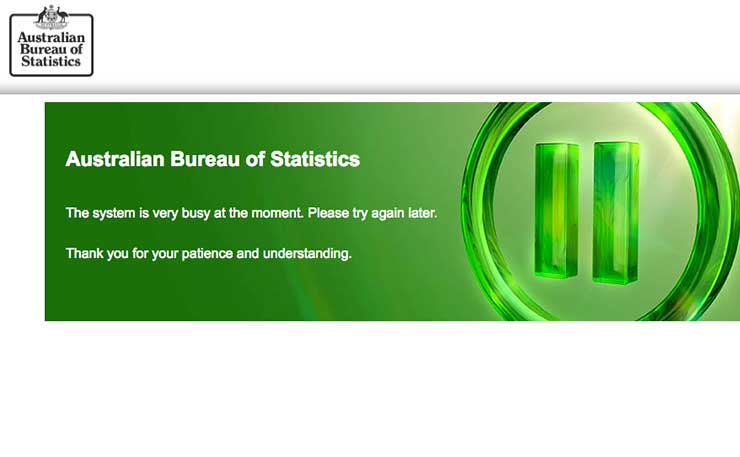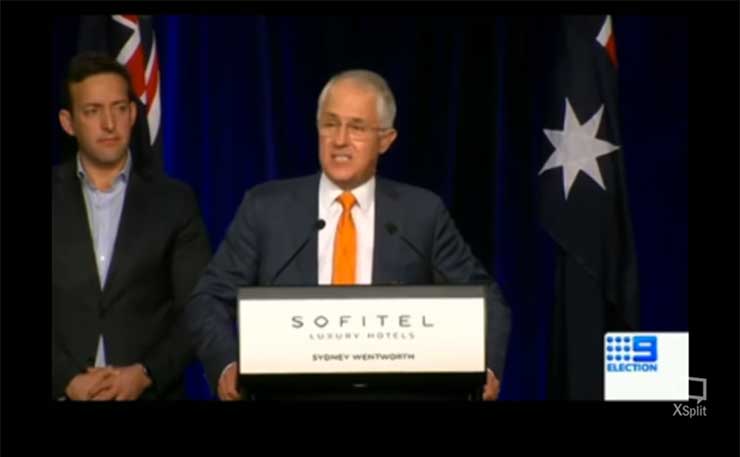The PM’s Census debacle undermined one of his big selling points, writes Ben Eltham.
In medieval times, the period between the death of the monarch and the coronation of a new ruler was known as the interregnum – the period between reigns.
Statesmen and diplomats of old considered it a dangerous period. Plots might be hatched; the power vacuum seized. It’s a point Malcolm Turnbull would be well advised to remember, as the long post-election period stretches on.
Australia is not truly in a state of interregnum – the government has been re-elected, after all – but it’s beginning to feel awfully like it. Whether by accident or design, the Prime Minister has largely been absent from the political stage since the July election. In his absence, much mischief has been made.
Consider the month of August, which has been disastrous for the government so far. The government badly mishandled the announcement of a royal commission into the abuses in the Don Dale jail in the Northern Territory. A hair trigger reaction to a devastating episode of the ABC’s Four Corners led Attorney-General George Brandis to appoint a commissioner, Brian Martin, who was demonstrably unfit for the job. Not only was Martin’s track record decidedly checkered, but as a justice of the Northern Territory who had sentenced young offenders to prison terms at Don Dale, he was being asked to investigate a criminal justice system he was himself part of. Brandis hadn’t bothered to consult with Indigenous leaders or communities before making his decision.
Martin duly resigned, only four days after accepting the commission. As a result, the government transformed a seemingly clear issue of Territory abuse into yet another example of George Brandis’ incompetence.
Last week, we saw the release of the devastating Nauru files, a ground-breaking investigation by the Guardian. In thousands of scarifying documents, the leak finally lays to rest any doubt about the brutality of Australia’s offshore immigration gulag.
The government’s response to the Nauru files has veered between complacent and risible. Immigration Minister Peter Dutton made the singular contribution of blaming victims. Scott Morrison claimed they were merely allegations, not statements of fact – despite the fact that the files were leaked from official reports by Nauru jailers Wilson Security.
The best Malcolm Turnbull could manage was a lukewarm promise to look into it. The files “will be carefully examined to see if there are complaints there or issues there that were not properly addressed,” he said last week.
So we’re getting a royal commission into abuses of children in Northern Territory detention, but nothing more than a “careful examination” of abuses of children in jail on Nauru. The glaring inconsistency is difficult even for this government to explain away.
HELP SUPPORT NEW MATILDA’S WRITERS. FUND OUR LATEST POZIBLE CAMPAIGN HERE.
On the weekend, Turnbull blundered again. In Western Australia for a conference of the state branch of the Liberal Party, the Prime Minister made an off-the-cuff promise to give Western Australia more revenue from the Goods and Services Tax. “We believe that we should take that opportunity – as the WA share of the GST increases under the current system – to change the arrangements so that we set a percentage floor below which no state’s receipts of GST can fall below,” he told the westerners, to predictable applause from Colin Barnett.
Just as predictably, the smaller eastern states were outraged. Tasmanian Senator Eric Abetz wasted no time in issuing an angry repudiation of the measure, pointing out that more GST for Western Australia would mean less for Tasmania. Queensland Premier Annastacia Palaszczuk agreed, accusing Turnbull of making “policy on the run.”
Both Abetz and Palazczuk have a point. The GST is not a magic pudding: giving one state extra will inevitably short-change others. And Turnbull does not appear to have consulted anyone on his idea to send extra GST west – certainly not the other state premiers, whose agreement he needs in order to change existing GST distribution arrangements. A little like Turnbull’s laughable proposal to give the states income tax, the GST proposal ended up making the Prime Minister look disorganised.
But when it comes to disorganisation, nothing can trump the omnishambles that is the 2016 Census. It’s difficult to know where to start on this fiasco, which has damaged the conduct of sound public policy in this country for decades.
There’s plenty of blame to go round, starting with the Australian Bureau of Statistics’ hapless David Kalisch, the $705,000 man who seems unable to take responsibility for the worst statistical stuff-up in the Bureau of Statistics’ history.
 Kalisch is the agency head who decided to take the Census online, and then manifestly failed to put the appropriate server resources in place to manage the demand from millions of Australians wanting to fill out their Census on Census night. He is the man who arrogantly batted away entirely justified concerns from privacy experts. Kalisch is the fellow that declared to the Sydney Morning Herald that “we are ready”, a week before the Census melt down.
Kalisch is the agency head who decided to take the Census online, and then manifestly failed to put the appropriate server resources in place to manage the demand from millions of Australians wanting to fill out their Census on Census night. He is the man who arrogantly batted away entirely justified concerns from privacy experts. Kalisch is the fellow that declared to the Sydney Morning Herald that “we are ready”, a week before the Census melt down.
To add insult to injury, Kalisch then blamed overseas hackers for the Census failure, despite no evidence of a DDoS attack, a claim that was later contradicted by the government’s Michael McCormack. This is a level of failure many standard deviations outside the mean.
But the government must also shoulder much responsibility. The responsible minister, the National Party’s Michael McCormack, had held the portfolio for just three weeks before Census night. Before that time, the ABS had reported to a range of different ministers under the Coalition, including the disappointing Kelly O’Dwyer. None of them appeared to take much interest in the critical agency.
Ultimately, this is a failure of appropriate resourcing. As has happened so often in recent years, ongoing and repeated funding cuts to a vital government agency have directly led to major and systemic failure. Damaging funding cuts dating back to the Rudd years have so eroded the Bureau’s ability to undertake its functions that former chief statistician Brian Pink had complained that the ABS was barely able to “keep the lights on.” The most recent funding cut, a whopping $50 million in 2014, led directly to the ABS shutting down a series of long-running surveys.
Remember that time the Coalition cut $50m from the ABS budget? Seems suddenly relevant pic.twitter.com/7JijhqpO6e
— Ben Eltham (@beneltham) August 10, 2016
As a result, the few tens of millions saved now will end up costing billions in the future. The Census costs money. Doing it properly is expensive, but stuffing it up is much costlier in the end.
The long-term damage to the government’s reputation from the Census train wreck will be just as significant. The act of census taking defines the modern state. As political scientist James Scott pointed out in his famous book Seeing Like a State, the collection of statistics about populations is one of the foundation stones of modern government.
Ordinary voters may not have studied political philosophy, but most people can grasp the critical importance of the Census for public policy. The Census numbers help governments plan for schools, roads and hospitals. The Census tells us about our ageing population, our unequal wealth distribution, and the multicultural makeup of our society. The Census tells us, ultimately, how many of us Australians there actually are. Only a government frankly contemptuous of the very notion of evidence could bungle the Census this badly.
The Census debacle damages Turnbull, because he has spent so much of his precious political capital on business-world notions of “agility” taken directly from the world of venture capital and IT. Turnbull has long promoted himself as modern and tech-savvy, and yet now he has presided over the worst technology failure by an Australian government in recent history. It’s a direct hit on Turnbull’s increasingly threadbare political persona.
But the Census is just one manifestation of a government that remains adrift, apparently without a second-term agenda. This is the deeper problem for Turnbull and the Coalition: explaining to voters exactly what his government stands for, and why the electorate should continue to support it.
That’s the peril of an interregnum. As the Italian Marxist Antonio Gramsci pointed out in the early 1930s, the period between regimes can bring with it political maladies. “The old is dying and the new cannot be born,” Gramsci scribbled in his prison cell. “In this interregnum a great variety of morbid symptoms appear.”
HELP SUPPORT NEW MATILDA’S WRITERS. FUND OUR LATEST POZIBLE CAMPAIGN HERE.
Donate To New Matilda
New Matilda is a small, independent media outlet. We survive through reader contributions, and never losing a lawsuit. If you got something from this article, giving something back helps us to continue speaking truth to power. Every little bit counts.





